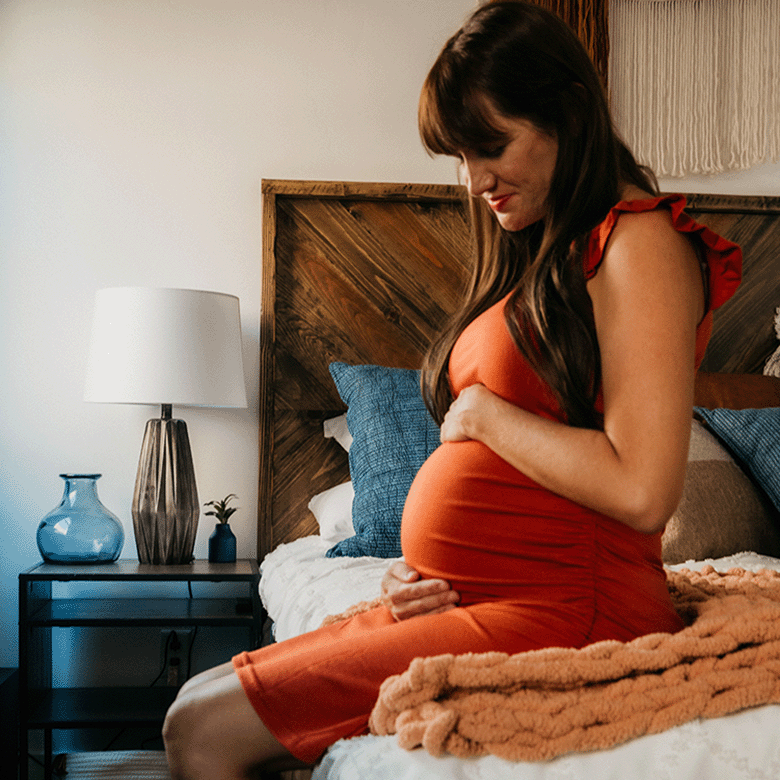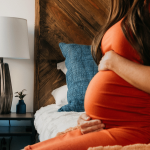
I always thought I was “pro-life”.
Until the day I was faced with an unexpected pregnancy in my 40s.
When I was younger, I of course knew that life began at conception -or maybe close enough at first heartbeat- but no matter where life began exactly, I knew that life was sacred and purposeful termination of life was akin to murder. Abortion was murder and abortion was wrong.
It was so simple back then. Just don’t have sex unless you’re married and then you’ll never have to worry about an unwanted pregnancy.
In my teens and early 20s, I never had to think about whether or not I’d ever have an abortion because, frankly, I wasn’t having sex. In my mind, abortion was only for those “promiscuous” women. Not something I’d ever have to deal with.
Yeaaaah.
Life has a funny way of kicking us in the butt and knocking us off our high horse.
I Thought An Accidental Pregnancy Couldn’t Happen To Me
Fast forward a couple of decades. I’m now 42 and in the middle of an unexpected and devastating divorce after a 17-year marriage. People do funny things when their life is falling apart, and I was no exception. Lonely, spiraling, and looking for distraction, I’d recently found myself a guy friend for companionship.
And now I was looking at a second line on a pregnancy test.
I was in complete disbelief.
This couldn’t be real.
This couldn’t be my life.
I couldn’t do this.
The judgment I’d get from others. The responsibilities of another child, this time as an older single mom. I already had three kids I was trying to figure out how to co-parent with my newly ex-husband. How could I handle a fourth? And with a different father? The physical handicaps of pregnancy. The costs of a new baby. The toddler years. How old I‘d be by the time this kid graduated high school. The supposed high risks of chromosomal defects due to my “advanced maternal age.” It all completely overwhelmed me, and I didn’t know what to do.
I didn’t want to do any of it.
I couldn’t do any of it.
And so the thought creeped in.
I didn’t actually HAVE to do this, did I?
I had options.
They were ugly and hard options, but maybe I could muster up the inner morality shift needed in order to choose it?
After all, I’d had early miscarriages before.
I could maybe convince myself this was just like that. A misfire. A nipping in the bud before a bud could develop. Especially if done quickly, before a heartbeat, perhaps it wasn’t yet a life. Perhaps it wouldn’t be murder. Perhaps, in a circumstance like mine, it wouldn’t be wrong.
Right?
But then I read that a fetus’s cardiac activity actually starts even earlier than I’d thought, between the fifth and sixth week of gestation. I was already 5 and a half weeks along.
I knew I could never forgive myself if I went through with it.
So I stepped out in faith, trusting the future to provide whatever it would.
Pregnancy In Your 40s & Looking For Support
I started looking online for support or guidance for an unplanned pregnancy in your 40s and was surprised as to what I found. I’d always been told, or led to believe, that getting pregnant in your 40s, or even after age 35, was difficult. I’d assumed that the majority of women in their 40s who got pregnant had done so purposely and with the help of reproductive technologies. And those who didn’t were likely to have a baby with chromosomal abnormalities or suffer other pregnancy complications, so pregnancy in your 40s was generally avoided.
But did you know that accidental pregnancy -and abortion- in your 40s is actually more common than most people realize?
While abortion ratios (the number of abortions per 1,000 live births) are highest in women age 24 and younger, the next highest abortion ratio age range is in women over 40. In fact, until the past couple of years, the abortion ratio for women in their 40s was more similar to the ratio for women aged 20-24 than for any other age.
This means that the common notion that crisis pregnancy services are primarily for, and should be targeted to, young women is not entirely correct. Women in their 40s are having abortions at similar rates as college students, yet while there’s ample support for young women considering abortions, there’s very little support available for the other end of a woman’s childbearing years.
Why Is There So Little Pro-Life Support For Older Mothers-To-Be?
1) Numbers Game
I suppose that for many people in the pro-life space, it’s just about numbers. There are more younger women getting pregnant in the first place, so this multiplies to many more abortions in this age range. If you’re trying to “save” the largest numbers of babies possible, then it makes sense to target this age range.
But if you’re concerned about pre-born life on an ethical level, then all life–whether being born to a woman in her early 20s or 40s–has equal value and accidental pregnancies in all age ranges should be supported.
2) Different Needs
It’s easier to meet the physical/emotional needs of a younger mother than an older mother. Most crisis pregnancy support for younger women focuses on things like providing needs such as diapers or guidance on how to navigate life with a baby. Young mothers-to-be are encouraged that they can still finish school, have a career, and that their life is not over just because they’re having an unexpected baby.
But older mothers-to-be? The world is already telling us how old we’ll be before finally being free from child raising. That we have an increasingly high risk of Downs Syndrome and there might be something “wrong” with our baby. That pregnancy will be harder, that we’re more likely to have complications, and if we have other children too, that adding yet another child is going to be too much for us to handle.
3) Not As Impressionable
Older women are not as easily swayed. We’re older, supposedly wiser, more likely to know what we want in life, and less likely to accept influence from others. But deep down, we’re just as scared of our accidental pregnancy as if we were teenagers. Perhaps even more so because we’re more aware of the reality of the situation.
What Can the Pro-Life Movement Do To Help When Facing An Accidental Pregnancy In Your 40s?
1) Don’t treat us like we’re old, but do treat us like we’re older.
Be real with us and don’t talk down to us. We’re grown adults, we know what caused the pregnancy and don’t need to tiptoe around it. But we may have misjudged our changing cycles and new, less predictable fertile windows and now feel embarrassed, believing that we’re old enough to have not let this happen.
Don’t B.S. us that our life is going to be fine with a baby. We’re aware of what we’re getting into. But we’re also terrified. We still need encouragement that our lives are not over. And we still need things like diapers and childcare.
2) More nuance when discussing health risks of older pregnancies.
The problem with most of the literature surrounding AMA (advanced maternal age) pregnancies is that the data is often not very stratified. Before terrifying women with all the things that could go wrong in an AMA pregnancy, we should start by assessing her personal health. A healthy woman in her 40s has a lower risk of pregnancy complications than an unhealthy woman in her 20s.
Even the current data on chromosomal abnormalities as we age doesn’t give us a full picture and shouldn’t be used as a scare tactic. While it’s true that there’s generally higher levels of chromosomal abnormalities in eggs as a woman ages, science still isn’t sure what causes this, why the level of abnormalities can differ from woman to woman, or how the woman’s body decides which egg(s) to mature and release each month. Some women release higher levels of abnormal eggs at younger ages, and some women release lower levels of abnormal eggs at older ages. Additionally, in naturally occurring pregnancies (which an unplanned pregnancy is likely to be) the woman’s body is more likely to aid in the natural selection of a releasing a normal egg than if the pregnancy had resulted from IVF.
There’s still so little we know about the causes of chromosomal abnormalities and it’s incorrect to assume that there’s likely to be something wrong with her baby just because a woman is older.
3) Talk more about the JOYS of older motherhood!
While the average woman is considered of childbearing age from mid-teens to mid-40s, society has deemed 25-35 as the “ideal” age to fall pregnant and trying to find examples in media of new mothers outside this range can be difficult. This can make both older and younger mothers feel out of place and that their pregnancies are undesirable, more of a burden, and less filled with joy.
I used to be terrified of having a baby in my 40s, but now that my son is here, he feels like such an incredible gift. I can appreciate him as a baby in a way I didn’t allow myself to with my older three kids. When my other kids were young, I existed in survival mode. With my infant son, every day with him feels precious. I’m also calmer, less stressed about all the little tasks that come with a baby, and more interested in connecting with my little guy as he begins this journey of life.
I know I’m only one person, with only my own experience, but I wish I could go back and tell the previous terrified pregnant version of myself how much I would actually really enjoy starting the motherhood journey all over again in my 40s.
Unplanned and accidental pregnancies can happen to a woman at any age. Even in her 40s. As someone who recently faced my own unplanned pregnancy at a later age, I wish there’d been more resources and support offered by those in the pro-life movement.







